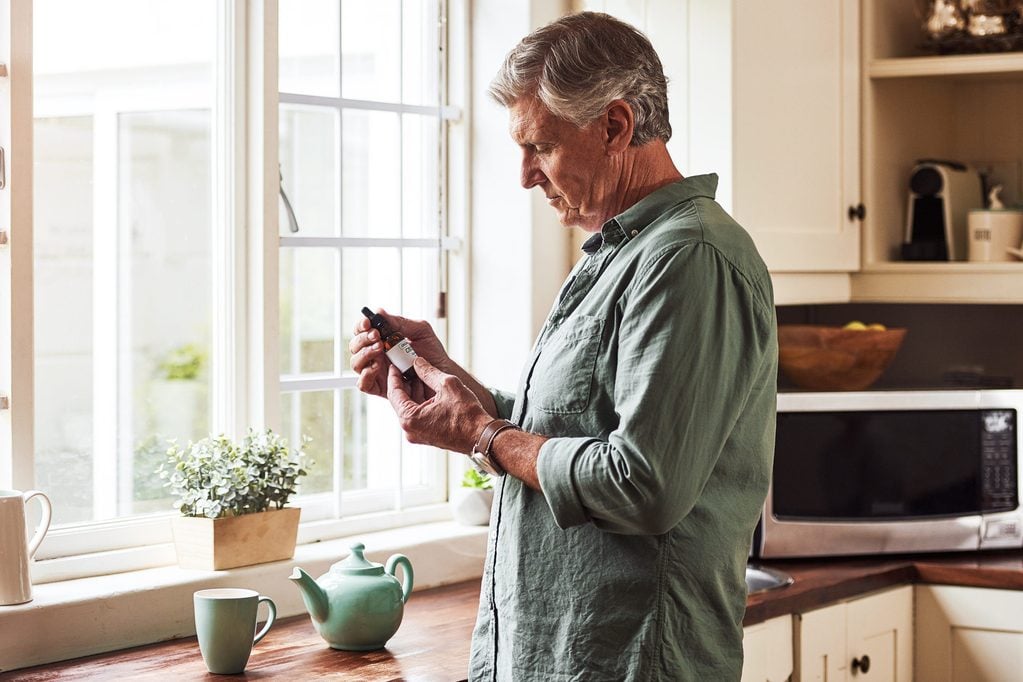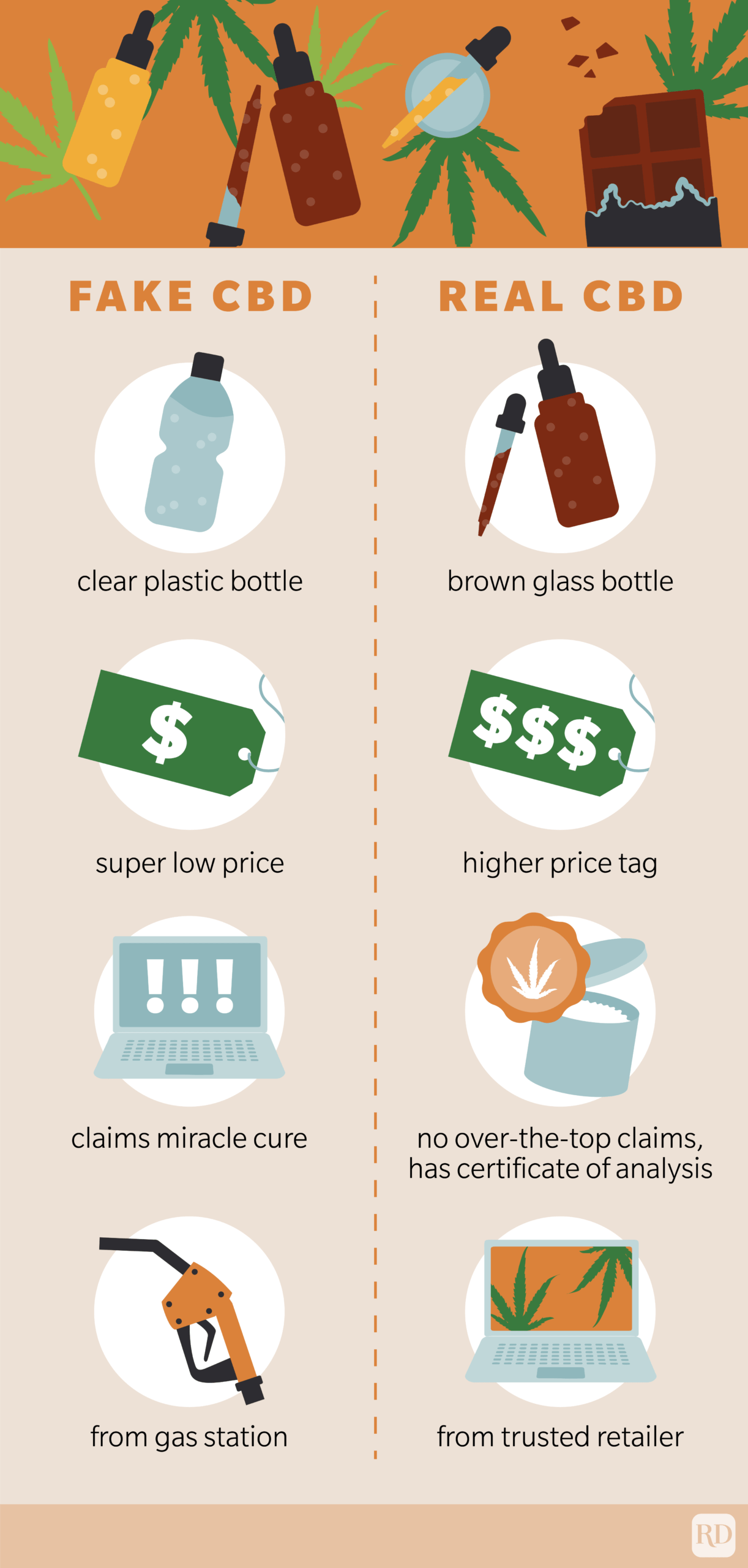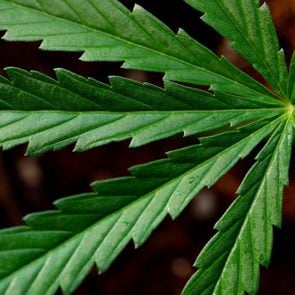7 Warning Signs a CBD Product Is Fake
Updated: Dec. 14, 2023

An alarming number of CBD products on the market fail laboratory testing for safety and efficacy. Learn how to discern between reputable brands and imposters.
It’s the “holy grail” everyone seems to recommend for any ailment from insomnia to arthritis these days: CBD. This molecule, derived from the cannabis plant, helps support the body’s endocannabinoid system, and that system is involved with nearly every biological process, including digestion, metabolism, hormone regulation, appetite, immunity, memory, emotions, and sleep.
Unlike its cannabinoid cousin tetrahydrocannabinol (THC)—the compound that causes the “high” commonly associated with cannabis—CBD doesn’t result in euphoric or psychoactive effects. But what you may get from its consumption are benefits to your health and well-being. While the FDA has only approved CBD as a treatment for three conditions at present, there is a growing body of research pointing to CBD’s ability to help prevent or treat myriad diseases and health disorders in people and pets. “Extensive preclinical research suggests that CBD has a lot of ‘anti’ powers,” notes The Essential Guide to CBD. “Specifically, it’s anti-tumoral, inhibiting tumor development; anti-spasmodic, suppressing muscle spasms; anti-convulsive, preventing seizures; and anxiolytic, inhibiting anxiety. It’s also neuroprotective, so it helps promote brain health.” Here are more facts you need to know about CBD.
However, there is one concern surrounding CBD’s usage: Even though it’s legal, it’s not regulated by the FDA—much like how the FDA isn’t authorized to review dietary supplement products (vitamins and minerals) for safety and effectiveness before they are marketed. And because there are no industry standards guaranteeing a minimum level of quality, the market is saturated with imposter CBD formulations.
Stressed about finding safe & effective CBD products? Relax, our new book, The Essential Guide to CBD, can help you correctly find the right product, and in the form that you need, from a source you can trust.

How prevalent are fake CBD products?
In July 2020, analytical testing laboratory SC Laboratories completed a study in conjunction with the United Cannabis Business Association (UCBA). The lab tested 17 samples purchased at unlicensed CBD shops or retailers in and around Los Angeles. The end result?
- More than 70 percent of the samples failed either for excessive contamination or did not qualify as hemp.
- 42 percent of the samples failed the safety testing compared with approximately 1.5 percent of samples that fail for contaminants on the regulated market.
- The level of contamination was several hundred times more than allowable limits in some cases.
- 53 percent of tested samples labeled as hemp or hemp-based did not qualify, by definition, as hemp. (The 2018 Farm bill classifies hemp as cannabis that contains no more than 0.3 percent total THC.)
- Most of the tested products contained levels of THC sufficient to cause serious psychoactive effects.
“CBD products can contain no CBD or less than the claimed amount,” says Aaron Riley, CEO of CannaSafe, California’s leading ISO-accredited cannabis testing laboratory. “The FDA has an initiative to put out CBD regulations, but guidance has been limited to date. This makes it more important for consumers to do their own due diligence.”
That means it’s up to you to distinguish the quality products from the scams. It’s definitely tricky, but there are some telltale signs that you should steer clear of certain items. Use the following criteria to spot fake CBD products.
There’s no testing information available
First and foremost, a CBD manufacturer should be able to produce a third-party certificate of analysis (COA) that shows how its products performed on screenings for CBD, THC, and any contaminants. A COA should include the product batch number; CBD and THC levels; and certification indicating that heavy metals, pesticides, and solvent residues fall within the range of allowable limits (which may vary state to state).
“If there is no information about product testing or if the product has an old and/or outdated COA, these are indicators that a product does not contain the advertised ingredients,” says Riley. This information should be available on the brand’s website, or there might be a QR code on the product itself that will lead you to these details for further inspection.
The label makes too-good-to-be-true marketing claims
If a bottle of CBD oil or capsules claims to “cure” anxiety or “fix” your sleep problems, that’s a big red flag. In fact, making health claims is only legal for prescription drugs and is strictly forbidden by the FDA and the Federal Trade Commission when it comes to supplements like CBD products. “I would avoid anything that claims to solve a medical ailment,” says Riley. “I’d also avoid over-the-top marketing lingo, such as ‘Real CBD’ or ‘100% CBD.'” There are other marketing scams to be aware of, as well: If the purchasing process seems too complex or you’re required to sign up for a subscription or membership service, buyer beware.
Amount-per-serving information isn’t listed
Just as you need to be wary of labels with too much outlandish information, you must also be cautious about labels that don’t share enough pertinent details. According to The Essential Guide to CBD, you should “look for products that tell you how much CBD and/or THC you’re getting per serving, not just the total cannabinoid content in the entire bottle. This can help you avoid dosing confusion, and it’s also extra assurance that what you’re buying actually contains the ingredients you’re looking for.”
The price is dirt cheap
Everyone loves a good bargain, but in the CBD world, a bargain may very well be a sign of a fake product. “If it’s too good to be true, it probably is,” warns Riley. “CBD is still expensive, and if a product is drastically cheaper than others, it may not have the CBD and ingredients advertised.” If you’re shopping on Amazon, here are more signs that a seller can’t be trusted—for CBD oil or anything else.
So, why is CBD so pricey? “Aside from the standard costs of running a business, there are many unique costs associated with CBD,” says Lital Shafir, head of product at Leafreport, a Tel Aviv–based educational platform with a mission to introduce transparency into the confusing CBD industry. “One of the best examples is specialized extraction equipment and qualified staff to use it. Then you’ve got the costs of growing hemp. Cultivating hemp can be labor-intensive and require extra expenditures for cultivation licenses and costs associated with state-specific hemp regulations. And let’s not forget additional costs for things like third-party testing.”
The ingredients aren’t things you want to ingest
Commercial CBD products can be full of subpar ingredients, including sweeteners, preservatives, and poor-quality oils. “When looking for an oral CBD oil, try to choose a product that is limited to just cannabis/CBD and a quality base oil—such as MCT oil,” says Kristina Risola, a National Board Certified Health and Wellness Coach with a focus in Cannabis Coaching who serves as lead faculty for Natural Wellness Academy’s Cannabis Coaching Program. “How CBD is listed on the label can vary. It may include things like CBD isolate, hemp oil, or full-spectrum hemp oil.”
Some products may also add in botanical or natural terpenes to mimic those lost in production—and this is OK with most products. “It’s important to note that hemp seed oil is not the same thing as CBD oil and should be listed as the carrier oil only,” says Risola, noting that it should definitely not be listed as the first ingredient.
It comes in a clear or plastic bottle
There’s a reason high-quality CBD oil comes in amber (brown) or dark-colored glass bottles (such as cobalt or green)—UV light breaks down the compounds of oil, and these darker colors provide more protection than clear glass. Reputable brands would only store their CBD oils in a bottle that will properly preserve the product. Similarly, plastic breaks down over time and can contaminate oil, so that’s another reason glass is the material of choice.
You bought it at a gas station
Convenience stores, big-box retailers (including Amazon), and gas stations sell a lot of great items, but CBD oil isn’t one of them. “It’s harder and harder to differentiate quality products from junk,” explains Risola, who says the person selling it to you should be able to tell you where it was grown, how it was processed, and how it got to their store shelf. And it’s hard to imagine the average Target or Chevron station employee would have that level of knowledge. While we’re on the subject, here’s what else you shouldn’t buy at a gas station.
And if the store employee works on commission or a store owner is secretly more concerned about his or her bottom line than a customer’s best interest, you could also be in trouble. “Be conscientious that a retailer will most likely steer you toward higher-margin products that may not be the best ones for you,” Riley cautions.
Sources:
- FDA: “What You Need to Know About Dietary Supplements”
- SC Labs: SC Labs Report: Hemp-derived CBD Products Analyzed to California Cannabis Compliance Standard”
- Aaron Riley, CEO of CannaSafe
- Lital Shafir, head of product at Leafreport
- Kristina Risola, a National Board Certified Health and Wellness Coach with a focus in Cannabis Coaching

